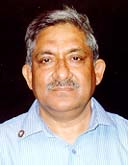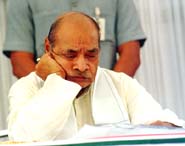The Rediff Special / N K Singh
Tewary had given clear instructions not to send anything in writing
 N K Singh is the CBI officer who arrested Indira Gandhi on October 3, 1977.
The first time a former Indian prime minister has gone to prison. Forced to return to his
home cadre in Orissa after she returned to power, this courageous and diligent Indian
Police Service officer was brought back to the CBI by V P Singh's government.
N K Singh is the CBI officer who arrested Indira Gandhi on October 3, 1977.
The first time a former Indian prime minister has gone to prison. Forced to return to his
home cadre in Orissa after she returned to power, this courageous and diligent Indian
Police Service officer was brought back to the CBI by V P Singh's government.
One of the first cases he was assigned was the St Kitts forgeries. Unfortunately, his
meticulous investigation into the case earned the wrath of the next prime minister, Chandra Shekhar, who transferred him out of the agency.
In the third of six extracts from his fascinating biography, The Plain Truth,
N K Singh reveals the dubious role played by K K Tewary in the St Kitts case which has now resulted in a
chargesheet against the former minister of state for external affairs.
According to the FIR, a few months before the newspaper reports
about St Kitts had appeared, the then minister of state for external
affairs, K K Tewary, had taken keen interest in locating and retaining
the passport papers containing the signatures of Ajeya Singh and
Abhay Singh. The latter is the second son of V P Singh.
In December 1988, Abhay Singh had applied for two additional visa sheets.
The passport authorities had found his papers in order. The matter
was, however, kept pending for clearance from Tewary's office.
When Abhay Singh made several enquires with the regional passport
office, New Delhi, it was discussed by the secretary with
Tewary as well as the then external affairs minister, P V Narasimha
Rao. Clearance for providing additional sheets to Abhay Singh
was given only on condition that photostat copies of the passport
would be retained in the ministry.
 Thereafter, almost a global search for the passport papers of
Ajeya Singh commenced in the ministry under the instructions of
K K Tewary, about which P V Narasimha Rao also must have been
aware. Frantic efforts were made by Indian embassies and high
commissions. Index cards maintained by the passport office in
India for ten years were checked over the phone. All passport officers
confirmed to the joint secretary that no passport had been issued
by them to Ajeya Singh since 1978.
Thereafter, almost a global search for the passport papers of
Ajeya Singh commenced in the ministry under the instructions of
K K Tewary, about which P V Narasimha Rao also must have been
aware. Frantic efforts were made by Indian embassies and high
commissions. Index cards maintained by the passport office in
India for ten years were checked over the phone. All passport officers
confirmed to the joint secretary that no passport had been issued
by them to Ajeya Singh since 1978.
The Indian high commission in London confirmed on December 22, 1988,
that it had checked all entries in the passport register, but in vain. The embassy
in Washington telephoned the joint secretary, ministry of external
affairs, on January 4, 1989 to say that the passport particulars
of Ajeya Singh could not be traced in the USA either. Ministry
officials had suggested to K K Tewary that instead of ascertaining
the availability of passport papers over phone, it was more convenient
to send a coded message.
Tewary, however, had given clear instructions
not to send anything in writing and arrange collection of these
papers only over the phone. The counselor, Indian embassy in Washington,
was once requested to inform K K Tewary, who was at that time
in New York, regarding non-availability of passport papers of
Ajeya Singh.
At long last, however, some passport papers were
located in the Indian high commission in UK and minister (coordination)
sent photocopies of the papers relating to the renewal of the passport
of Ajeya Singh to the MEA at New Delhi. These included two applications
of Ajeya Singh, dated February 1, and September 23, 1977, for
renewal of passport and contained his genuine signature. Under
instructions from K K Tewary, the papers were then carefully retained
in the personal custody of the joint secretary.
As soon as Ajeya Singh denied the existence of an account in his
name in St Kitts, the then director of enforcement, K L Verma,
had discussions with the special director, enforcement, and the chief enforcement
officer, and a decision was taken to issue a directive to Ajeya
Singh under Section 33(2). They had initiated this action on the
basis of newspaper reports and allegations of two members of Parliament -- Kalpnath
Rai and Ratnakar Pande -- to the President of India to the effect
that Ajeya Singh, while working in London, had received commissions
on behalf of his father, who was then Union finance minister and
was holding additional charge of the commerce ministry.
It defies comprehension as to how for more than two years, no action was
taken on such serious allegations made against the finance minister
by two honorable members of Parliament, one of whom went to jail in a
TADA case this year, for his alleged links with Dawood Ibrahim.
Suddenly, in September 1989, the allegations by the two MPs became
relevant for action under FERA. Ajeya Singh was served with another
notice under Section 50 or 56 of FERA.
Apart from volunteering to waive bank secrecy and immunity to enable the Government of
India to make enquires, Ajeya Singh had also in his reply contended
that he had never been to Basseterre, capital of St Kitts, that
the signatures on the documents were not his and that some of
the deposits were shown to have been made on holidays and weekends
when, according to settled banking practice, no transactions take
place.
Excerpted from The Plain Truth, Memoirs Of A CBI Officer, by N K Singh,
Konarak, 1996, Rs 395, with the publisher's permission. Readers may direct inquiries
about the book to Mr K P R Nair, Konarak Publishers, A-149, Main Vikas Marg, Delhi 11 00 92.
|









